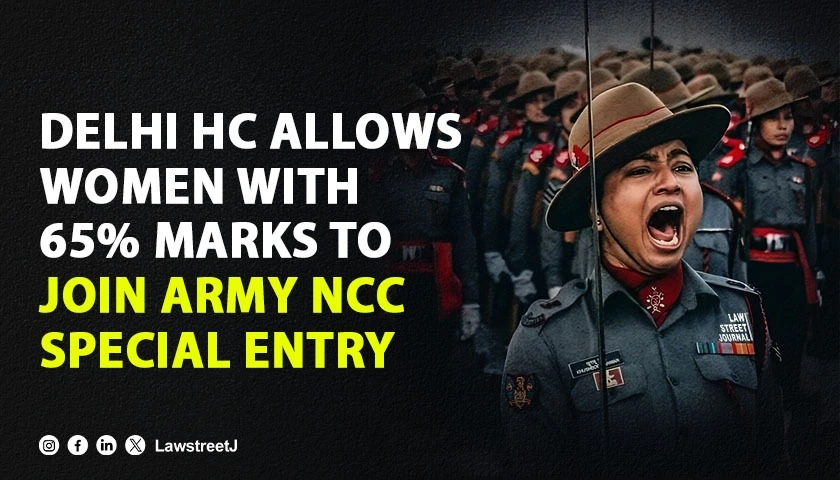New Delhi: The Delhi High Court has delivered a significant interim directive aimed at ensuring gender equality in Army recruitment, directing that women candidates with 65% marks be allowed to participate in the selection process despite higher cut-off requirements.
Justice C. Hari Shankar and Justice Ajay Digpaul addressed the case involving a writ petition filed by Kanika Maurya and another petitioner challenging the disparate cut-off marks set by the Indian Army for men and women candidates under the NCC Special Entry Scheme for Short Service Commission.
The court noted the Army's advertisement which stated, "Degree of a recognized University or equivalent with aggregate of minimum 50% marks taking into account marks of all the years" as the basic eligibility criteria, while reserving "the right to apply a higher cut off percentage on the aggregate degree marks to shortlist candidates."
Addressing the specific discrimination in cut-off marks, the court observed, "Apparently in exercise of this power that stands reserved with the Army, and purportedly towards by way of exercising of the liberty to shortlist, the respondents notified a cut-off of 65% for men and 75% for women, for further consideration in the selection process."
The court highlighted the gender disparity, stating, "It is this disparate fixing of cut-off marks between men and women that constitutes the basis of the grievance of the petitioners, who are women candidates aspiring for Short Service Commission."
The Army's response through para-wise comments attempted to justify the differential treatment, arguing, "The parity in shortlisting with respect to Men and Women candidates is maintained by having equal vacancy to number of candidates shortlisting for the vacancies." They claimed that "Women have been given 3.42 times the advantage for SSB."
However, the court found this justification insufficient, noting that while there were 70 vacancies for men and only 6 for women, "the number of short-listed men candidates is 11148, whereas the number of short-listed women candidates is only 6820."
In a significant directive emphasizing gender equality, the court stated, "Keeping in mind the fact that the Supreme Court has, in recent years, emphasised the aspect of gender equality, especially in the matter of recruitment to the Armed Forces, we are of the opinion that, pending further orders, the petitioners, if they have secured more than 65% in their degree/graduation, should be subjected to further rounds of selection."
The court has directed that "the petitioners would be permitted to undergo the SSB which is now scheduled on 26 May 2025 and to participate in further rounds of selection."
The court emphasized the Army's responsibility to ensure compliance, directing, "It would be for the respondent to ensure that the petitioners are permitted to appear in the SSB either by opening the portal so that they would apply, or by making any other arrangements."
The court has scheduled the matter for detailed hearing on 23 July 2025, allowing the respondents four weeks to file their reply.
Mr. Anshuman Mehrotra and Ms. Devika Mehra, Advocates appeared for the Petitioners, and Mr. Vikrant N. Goyal, Senior Panel Counsel, with Ms. Uma Tarafdar, Mr. Sumit Goswami and Mr. Nishu Dagar, Advocates ppeared for the Union of India, instructed by Major Anish Muralidhar.
Case Title: Kanika Maurya & Anr. vs. Union of India & Ors.







![Delhi High Court Sets Aside Arbitral Tribunal's Award Against NHAI in Highway Project Delay Case [Read Judgment]](/secure/uploads/2023/07/lj_9605_23374c2e-392c-4491-a2fe-f2f12fc5272f.jpg)
![Delhi Court Rejects Stay Request in Defamation Case Against Rajasthan CM Ashok Gehlot [Read Order]](/secure/uploads/2023/08/lj_5208_80de1ddc-d76a-4f7f-b180-408e3ae14fb4.jpg)





